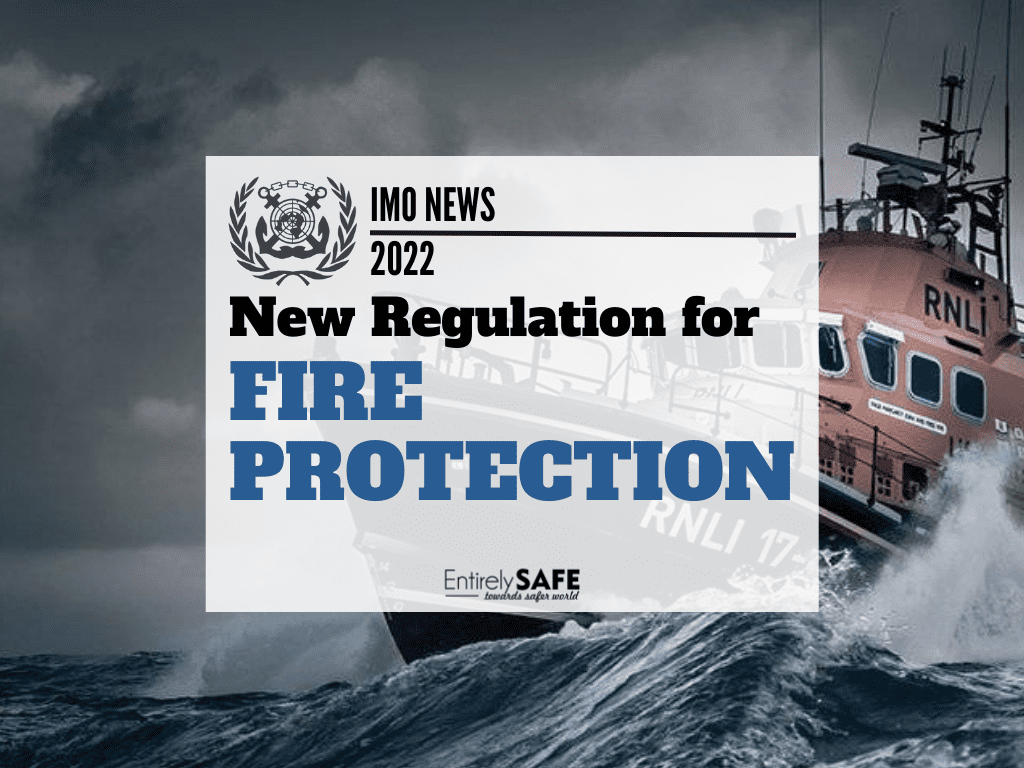IMO New Regulations for Fire Protection 2022

Fire Safety on Ro-Ro Passenger Ships
In pursuing work to build upon the Interim Guidelines for Minimizing the Incidence and Consequences of Fires in RoRo Spaces and Special Category Spaces of New and Existing Ro-Ro Passenger Ships (MSC.1/Circ.1615), the SubCommittee further progressed the development of several amendments to SOLAS Chapter II-2 and associated codes to improve fire safety requirements on new and existing Ro-Ro passenger ships. The amendments, applicable to enclosed ro-ro spaces and on-weather decks intended for the carriage of vehicles on Ro-Ro passenger ships, will introduce several key features intended to improve fire safety.
The amendments applicable to new Ro-Ro passenger ships include requirements for:
- Individually identifiable fixed fire detection and alarm systems, compliant with the FSS Code, providing smoke and heat detection throughout the vehicle, special category, and ro-ro spaces;
- Fixed fire-detection and alarm systems for the area on weather decks of passenger ships intended for the carriage of vehicles;
- Continuous video monitoring of vehicle, special category, and ro-ro spaces;
- New requirements for structural fire protection and arrangement of openings; and
- Fixed water-based fire extinguishing systems for weather decks intended for the carriage of vehicles.
The amendments applicable to existing Ro-Ro passenger ships include requirements for the following:
- Fixed fire detection and alarm systems, compliant with the FSS Code, providing smoke and heat detection throughout the vehicle, special category, and ro-ro spaces; and
- Continuous video monitoring of vehicles, special category, and ro-ro spaces.
However, issues related to openings in boundaries of ro-ro decks and safety distance between ro-ro weather decks and accommodations are still pending agreement and will be further discussed intersessionally.
Next Steps: The draft amendments will be further developed in an intersessional correspondence group and at SSE 9 (Mar-2023). The anticipated entry into force date will be 1 January 2026 for new ships. Requirements for existing ships are anticipated to be applicable by the first survey after 1 January 2028.
Amendments to the FSS Code
In conjunction with the above-noted amendments to SOLAS Chapter II-2, the Sub-Committee further progressed the development of several amendments to Chapter 7 (Fixed Pressure Water-Spraying and Water Mist Fire Extinguishing Systems) and Chapter 9 (Fixed Fire Detection and Fire Alarm Systems) of the FSS Code.
- A new section 2.5 will be added to Chapter 7, to address fixed water-based fire-extinguishing on ro-ro passenger ships’ weather decks intended for the carriage of vehicles. Specifications are provided for the positioning, volumetric capacity, and water supply for fire monitors in this service.
- Several new requirements are introduced into section 2.5.1 of Chapter 9, to specify system control requirements for the fixed fire detection and alarm systems provided in-vehicle, special category, and ro-ro spaces
However, issues related to the inclusion of linear heat detection in the FSS Code, as well as consideration of the feasibility of existing ships to comply with these amendments, are still pending agreement and will be further discussed intersessionally.
Next Steps: The draft amendments will be further developed in an intersessional correspondence group and at SSE 9 (Mar-2023). The anticipated entry into force date will be 1 January 2026 for new ships. Requirements for existing ships are anticipated to be applicable by the first survey after 1 January 2028.
Prohibition of Use of Fire-Fighting Foams Containing PFOS Onboard Ships
The Sub-Committee finalized amendments to SOLAS Chapter II-2 and the HSC Codes (1994 and 2000) to introduce the prohibition of use or storage of fire-fighting foams containing PFOS (perfluorooctane sulfonic acid) for fire-fighting onboard ships. PFOS has been deemed hazardous to the marine environment and human beings, and this prohibition will apply to both fixed and portable systems.
This prohibition is being introduced into SOLAS and the HSC Codes by the addition of a new section “Fire Extinguishing Media Restrictions” in each respective text, so that it will be easier to include future prohibitions or limitations of extinguishing media shown to be dangerous to people and the environment. This prohibition will be applicable to both new and existing ships from 1 January 2026, with a phase-in approach implemented for existing ships.
Next Steps: The draft amendments will be presented to MSC 106 (Nov-2022) for further consideration and approval, with subsequent adoption at MSC 107 (Jun-2023).
Revised Guidelines for Approval of Fixed Dry Chemical Powder Fire-Extinguishing Systems on Ships Carrying Liquefied Gases in Bulk
The Sub-Committee finalized revisions to the Guidelines for the Approval of Fixed Dry Chemical Powder FireExtinguishing Systems for the Protection of Ships Carrying Liquefied Gases in Bulk (MSC.1/Circ.1315), which will apply to new installations. Under the current version of this circular, a representative system installation is to be subjected to a full-scale fire test to the satisfaction of the Administration. The revised Guidelines will provide details for conducting the full-scale test in support of a system type approval.
Next Steps: The draft amendments will be presented to MSC 106 (Nov-2022) for further consideration and approval.
Fires on Containerships – Guidelines for Design, Performance, Testing and Approval of Water Mist Lances
As part of an ongoing effort to improve the detection and control of fires on containerships, the Sub-Committee received a proposal for guidelines for the design, performance, testing, and approval of water mist lance systems used for the protection of on-deck cargo areas of ships designed and constructed to carry five or more tiers of containers on or above the weather deck. These guidelines provide a standard of approval by Administrations for such appliances and also provide guidelines on the operational capabilities of the appliance (i.e. must be capable of being operated by a single crew member within a specified time period).
However, it was noted that the Sub-Committee has an ongoing output concerning fire protection on containerships, which will be informed by a Formal Safety Assessment (FSA) on containerized cargo fires that are currently being conducted by EMSA. Rather than progress the development of these guidelines as a single-risk solution, the SubCommittee agreed to postpone their consideration in favor of a holistic approach to containership fire safety, once the FSA is complete.
Next Steps: Consideration of the draft guidelines will be postponed until a future session, pending completion of an FSA on containership fire safety. The Sub-Committee requested MSC 105 (Apr-2022) to establish an FSA Experts Group to review the outcomes of EMSA’s “Study Investigating Cost Efficient Measures for Reducing the Risk from Cargo Fires on Container Vessels (CARGOSAFE)” and to report back to the Sub-Committee.
Fire Protection of Control Stations on Cargo Ships
The Sub-Committee received proposals for amendments to SOLAS Regulation II-2/7.5.5 and MSC.1/Circ.1456 with respect to the protection of control stations on new cargo ships. The draft SOLAS amendment will include “control stations” in the spaces where a fixed fire detection and fire alarm system is required for the construction methods described in SOLAS Regulation II-2/7.5.5. The Sub-Committee also finalized draft revisions to the unified interpretations given in MSC.1/Circ.1456 that will remove the previous interpretation that control stations do not need to be covered by fixed fire detection and fire alarm system.
Next Steps: Due to time constraints, discussions on this subject will continue in an intersessional correspondence group and at SSE 9 (Mar-2023).
Unified Interpretations of SOLAS Chapter II-2 / Regulation 9.7
The Sub-Committee agreed to new unified interpretations of SOLAS Chapter II-2. The following interpretations address arrangements of duct penetrations through fire-rated divisions:
- Regulation II-2/9.7.3.1.2 – The fire insulation required by regulation SOLAS II-2/9.7.3.1.2 should be provided only to the part of the duct and/or sleeve that is on the same side of the division being fire insulated and be extended for a minimum of 450 mm along the duct and/or sleeve.
- Regulation 9.7.3.2 – When a duct passing through a division is to be in accordance with SOLAS regulations II-2/9.3.2 and II-2/9.7.3.2, no clearance should be allowed between the duct and the division.
Next Steps: The draft unified interpretations will be presented to MSC 106 (Nov-2022) for further consideration and approval.
Amendments to the 2014 Standard Specification for Shipboard Incinerators (Resolution MEPC.244(66))
Following proposals made at MEPC 77, the Sub-Committee agreed to revisions to the 2014 Standard Specification for Shipboard Incinerators (resolution MEPC.244(66), which were aimed toward correcting discrepancies between the 2014 Standards and SOLAS Chapter II-2 regarding fire protection requirements for incinerators and waste stowage spaces.
It was agreed that Annex 2 of MEPC.244(66) (“Fire Protection Requirements for Incinerators and Waste Stowage Space”) should be removed from the resolution, as the content of this annex was not necessarily a part of the technical specifications of the incinerator itself. The fire safety requirements of SOLAS Chapter II-2 are considered sufficient for incinerator and waste stowage spaces and should be applied accordingly.
Next Steps: The draft amendments will be presented to MEPC 79 (Dec-2022) for further consideration and adoption of a revised MEPC resolution.

